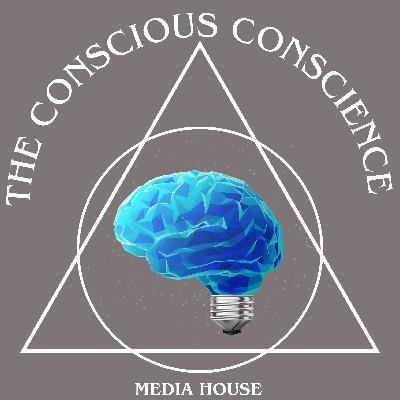The Illuminati: Secret Society or Overhyped Meme?
Description
“The Illuminati: Secret Society or Overhyped Meme?”
INTRO
“Welcome to the conscious conscience, the show where we unpack conspiracies, debunk nonsense, and still manage to find the fun in it all. I’m your host Delilah. I don’t know what they’re doing in New York but Today in Atlanta, we’re diving into one of the most infamous buzzwords in conspiracy culture: the Illuminati. You’ve heard about them in music videos, on late-night YouTube rabbit holes, and even in that one conversation your uncle insists on having every Thanksgiving. But who—or what—are the Illuminati? Let’s get into it.”
SECTION 1: ORIGINS OF THE ILLUMINATI
“First things first, the Illuminati did exist. Shocking, right? I mean not really, most of this stuff has some history rooted in fact or it wouldn’t be captivating and easy to believe. So let’s talk about the Illuminati. They weren’t just the stuff of triangle emojis and eye-pyramid tattoos. Back in 1776, a guy named johann Adam Weishaupt (wisehowpt) founded the Bavarian Illuminati in Germany. His goal? To promote Enlightenment ideals like reason, science, and separation of church and state. Essentially, they were the nerdy revolutionaries of their time—like if Reddit mods existed in powdered wigs.
But here’s the kicker: they were a real group for about a decade before they fizzled out. Why? Because the government got freaked out and banned secret societies, which, I mean, fair enough. Turns out, calling yourself a ‘secret society’ isn’t the best PR move when monarchs are paranoid about losing power. So, historically speaking, the Illuminati as a functioning organization ended in the late 1700s. Yep, they’re more of a one-hit wonder than a centuries-long shadow government.”
NOW THAT SOUNDS BORING SO YOURE PROBABLY WONDERING HOW DID THE ILLUMINATI BECOME A MODERN OBSESSION?
“Well let’s fast forward to the 20th century, when the Illuminati suddenly made a big comeback—but not as a real group. Instead, they became the boogeyman of conspiracy theories. And a lot of this was thanks to—get this—satire.
In the 1960s, authors Robert Anton Wilson and Robert Shea wrote a trilogy of books called The Illuminatus! Trilogy. Ironically, it was meant to poke fun at conspiracy culture by mixing fiction with absurd theories. But you know what happened? People took it seriously. Yep, they ran with it. Imagine writing a parody and having people believe it’s gospel. That’s like writing fan fiction about your favorite band and having the internet turn it into ‘evidence’ of a secret love affair. Kinda sounds a tad ridiculous when you really zoom out and look at the big picture—but it is often mystifying, and a justifiable place for misplaced anger when you’re watching YouTube or reading Reddit post..
Oh, and let’s not forget pop culture. Every time Jay-Z throws up a triangle, or Beyoncé stands in front of an eye-shaped backdrop, someone shouts, ‘Illuminati confirmed!’ Newsflash: It’s called marketing. Symbolism sells, and these artists are smart enough to use it to their advantage. No secret cabals required. This ends up being an intensified narrative because they often lean directly into it. Shock sells and these people are wealthy!
SECTION 3: SO WHY DO PEOPLE BELIEVE IN THE ILLUMINATI TODAY?
“Let’s be real—part of the reason the Illuminati idea sticks is because it feeds into a need for explanations. The world is chaotic. There are wars, wealth gaps, corruption. It’s tempting to think, ‘There must be someone behind the curtain pulling the strings.’ It’s easier to blame an all-powerful secret group than confront the complexity of politics, economics, and human behavior.
But here’s the thing: believing in the Illuminati doesn’t make the world less chaotic. In fact, it can distract from real issues—like the very real ways power and money shape society. It’s not some secret triangle club in a basement; it’s systems we can see, critique, and work to change.
And here’s where I’ll put my foot down: accusing people of being Illuminati members, especially celebrities, doesn’t just sound silly—it can also be harmful. It feeds paranoia and often targets individuals unfairly and also distracts from the seriousness of actual crimes they may or may not have committed. It as you could say, memifys real issues. So maybe next time we see a pop star doing something cool, we can just appreciate their talent without assuming they’re running a shadow government, yeah?”
SECTION 4: CLOSING THOUGHTS
“So, what’s the takeaway here? The Illuminati was a real group, but they’re long gone. The modern version is more of a cultural meme thanks to a 1960s satire than an actual global puppet master. Instead of searching for triangles in music videos, maybe we focus on the real sources of power and how they affect our lives.
And hey, if you really need a secret society fix, start one with your friends! But, like, keep it wholesome. Maybe a secret book club? Call it the ‘League of Late-Night Readers.’ Sounds way more fun than pretending to rule the world from a shadowy corner.
Thanks for joining me today! Next episode, we’re tearing apart The Illuminati: From History to Internet Sensation and really looking at the meme culture that keeps it running n a world of people driven by fear — Until then, stay curious, stay critical, and don’t trust everything you read on the internet—except, of course, this podcast. See you next time!”
OUTRO MUSIC & CREDITS (Energetic fade-out)













